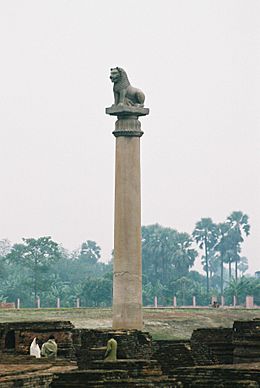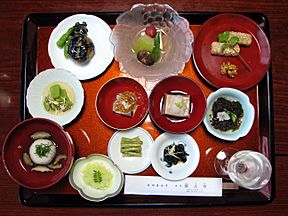Buddhist vegetarianism facts for kids
Buddhist vegetarianism is the practice of vegetarianism by Buddhist monks and nuns (as well as laypersons) and some Buddhists of other sects. In Buddhism, the views on vegetarianism vary between different schools of thought. The Mahayana schools generally recommend a vegetarian diet because Gautama Buddha set forth in some of the sutras that his followers must not eat the flesh of any sentient being.
Contents
Early Buddhism

The earliest surviving written accounts of Buddhism are the Edicts written by King Ashoka, a well-known Buddhist king who propagated Buddhism throughout Asia, and is honored by both Theravada and Mahayana schools of Buddhism. The authority of the Edicts of Ashoka as a historical record is suggested by the mention of numerous topics omitted as well as corroboration of numerous accounts found in the Theravada and Mahayana Tripitakas written down centuries later.
Asoka Rock Edict 1 dated to c. 257 BCE mentions the prohibition of animal sacrifices in Ashoka's Maurya Empire as well as his commitment to vegetarianism; however, whether the Sangha was vegetarian in part or in whole is unclear from these edicts. Ashoka's personal commitment to, and advocating of, vegetarianism suggests Early Buddhism (at the very least for the layperson) most likely already had a vegetarian tradition.
Views of the three Buddhist vehicles
There is a divergence of views within Buddhism as to whether vegetarianism is required; with some schools of Buddhism rejecting such a requirement. Some Buddhists avoid meat consumption because of the first precept in Buddhism: "I undertake the precept to refrain from taking life". Other Buddhists disagree with this conclusion.
Theravada view
The most clear reference in Theravada Buddhism to monastic consumption of non-vegetarian food is found in the Pali Canon, where the Buddha once explicitly refused a suggestion by Devadatta to mandate vegetarianism in the monks' Vinaya monastic code. This refusal to proscribe non-vegetarian food is within the context of Buddhist monastics receiving alms food.
The Buddha in the Aṅguttara Nikāya 3.38 Sukhamala Sutta, before his enlightenment, describes his family being wealthy enough to provide non-vegetarian meals even to his servants. After becoming enlightened, he respectfully accepted any kind of alms food offered with good intention, including meat (within the limitations described above), fruit and vegetables.
In the modern era, the passage cited below has been interpreted as allowing the consumption of meat if it is not specifically slaughtered for the monastic receiving alms food:
… meat should not be eaten under three circumstances: when it is seen or heard or suspected (that a living being has been purposely slaughtered for the eater). —Jivaka Sutta, MN 55 , unpublished translation by Sister Uppalavanna
Also in the Jivaka Sutta, Buddha instructs a monk or nun to accept, without any discrimination, whatever alms food is offered with good will, including meat.
There were monastic guidelines prohibiting consumption of 10 types of meat: that of humans, elephants, horses, dogs, snakes, lions, tigers, leopards, bears and hyenas. This is because these animals (allegedly) can be provoked by the smell of the flesh of their own kind, or because eating of such flesh would generate a bad reputation for the Sangha.
Mahayana view
Mahayana views on vegetarianism differ. The Buddhist vegetarian who does not observe Buddhist ethics is not seen as a true Buddhist vegetarian.
According to the Mahāyāna Mahāparinirvāṇa Sūtra, the Buddha insisted that his followers should not eat any kind of meat or fish. Even vegetarian food that has been touched by meat should be washed before being eaten. Also, it is not permissible for the monk or nun just to pick out the non-meat portions of a diet – the whole meal must be rejected.
The Buddha in certain Mahayana sutras very vigorously and unreservedly denounced the eating of meat, mainly on the grounds that such an act is linked to the spreading of fear amongst sentient beings (who can allegedly sense the odor of death that lingers about the meat-eater and who consequently fear for their own lives) and violates the bodhisattva's fundamental cultivation of compassion. Moreover, according to the Buddha in the Aṅgulimālīya Sūtra, since all beings share the same "Dhatu" (spiritual Principle or Essence) and are intimately related to one another.
In the Mahāyāna Mahāparinirvāṇa Sūtra, which presents itself as the final elucidatory and definitive Mahayana teachings of the Buddha on the very eve of his death, the Buddha states that "the eating of meat extinguishes the seed of Great Kindness", adding that all and every kind of meat and fish consumption is prohibited by him. He specifically rejects the idea that monks who go out begging and receive meat from a donor should eat it: "[I]t should be rejected... I say that even meat, fish, game, dried hooves and scraps of meat left over by others constitutes an infraction... I teach the harm arising from meat-eating."
Mahayana lay Buddhists often eat vegetarian diets on the vegetarian dates (齋期 zhāi qī). There are different arrangement of the dates, from several days to three months in each year, in some traditions, the celebration of the bodhisattva Avalokiteśvara's birthday, Bodhi Day and Great Renunciation days hold the highest importance to be vegetarian.
Vajrayana view
Some Vajrayana practitioners eat meat.
Common practices
Theravada
In the modern world, attitudes toward vegetarianism vary by location. In Sri Lanka and the Theravada countries of South East Asia, monks are obliged by the vinaya to accept almost any food that is offered to them, including meat, unless they suspect the meat was slaughtered specifically for them.
Chinese, Korean, Vietnamese, and Taiwanese traditions
In China, Korea, Vietnam, Taiwan and their respective diaspora communities, monks and nuns are expected to abstain from meat and, traditionally, eggs and dairy, in addition to the fetid vegetables – traditionally garlic, Allium chinense, asafoetida, shallot, and Allium victorialis (victory onion or mountain leek), although in modern times this rule is often interpreted to include other vegetables of the onion genus, as well as coriander – this is called pure vegetarianism or veganism (純素 chún sù / 淨素 jìng sù / 齋 zhāi). Pure Vegetarianism or Veganism is Indic in origin and is still practiced in India by some adherents of Dharmic religions such as Jainism and in the case of Hinduism, lacto-vegetarianism with the additional abstention of pungent or fetid vegetables.
A minority of Buddhist lay believers are year-long or life-long vegetarians. Many lay followers typically adhere to monastic-style vegetarianism on Lunar New Year Eve, commemorative holidays and ancestral feast days, as well as the first and fifteenth day of the lunar calendar. Some lay followers also follow monastic-style vegetarianism on the six-day (六日齋), ten-day (十日齋), Guan-yin (Avalokitesvara) vegetarian (觀音齋) etc., and follow according to that lunar calendar schedule. Other Buddhist lay-followers also follow less stringent forms of vegetarianism. Most Buddhist lay-followers however are not vegetarians. Some Zhaijiao lay adherents also do not eat any meat.
Japanese traditions
Japan initially received Chinese Buddhism in the 6th century. In 675, Emperor Tenmu issued an edict prohibiting eating the meat of cows, horses, dogs, monkeys, and roosters, as recorded in the Nihon Shoki. Despite this, animal products remained in the Japanese diet long after the 675 edict. References to hunting and eating deer and wild boar continued throughout the ancient and medieval period into the 16th century as an occasional part of the diet for all but those in the poorer agrarian classes. The court nobles also ate red meat occasionally, despite being obliged to follow Buddhist principles closely, although it was viewed as inferior to eating fish and birds.
Around the 9th century, two Japanese monks (Kūkai and Saichō), introduced Vajrayana Buddhism into Japan, and this soon became the dominant Buddhism among the nobility. In particular, Saichō, who founded the Tendai sect of Japanese Buddhism, reduced the number of vinaya code to 66. (円戒 yuán jiè) During the 12th century, a number of monks from Tendai sects founded new schools (Zen, Pure Land Buddhism) and de-emphasised vegetarianism. Nichiren Buddhism today likewise deemphasises vegetarianism. Zen does tend generally to look favourably upon vegetarianism. Shingon Buddhism, founded by Kūkai, recommends vegetarianism and requires it at certain times, but it is not always strictly required for monks and nuns. Buddhist vegetarianism (aka Shojin Ryori), also dictates Kinkunshoku (禁葷食) which is to not use meat as well as Gokun (五葷 5 vegetables from the allium family) in their cooking.
In 1872 of the Meiji restoration, as part of the opening up of Japan to Western influence, Emperor Meiji lifted the ban on the consumption of red meat. The removal of the ban encountered resistance and in one notable response, ten monks attempted to break into the Imperial Palace. The monks asserted that due to foreign influence, large numbers of Japanese had begun eating meat and that this was "destroying the soul of the Japanese people."
Tibetan traditions
The practice of non-harming forms the basis of all three vehicles of Buddhist philosophy. For this reason, the Buddha gave advice to the Buddhist community of monastics in the Vinaya concerning food and the consumption of meat, since monastics traditionally relied upon alms given to them by the local community for sustenance on occasions which may include meat, and to refuse such offerings could be considered as going against their vows. The Buddha made clear distinctions between eating meat and killing, by giving instructions on the three-fold purity of meat.
In Tibet, where vegetables are scarce, meat is often consumed as a form of sustenance. However, records show that in Tibet, the practice of vegetarianism was encouraged as early as the 14th and 15th centuries by renowned Buddhist teachers such as Chödrak Gyatso and Mikyö Dorje, 8th Karmapa Lama.
Contemporary Buddhist teachers such as the Dalai Lama, and The 17th Karmapa Ogyen Trinley Dorje, invite their audiences to adopt vegetarianism whenever they can. Chatral Rinpoche in particular stated that anyone who wished to be his student must be vegetarian.





